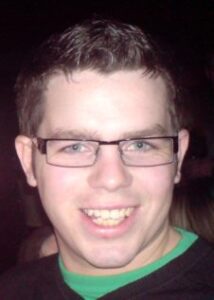Graham tells us about life without Jon
Some dads are good ‘fixers’ – mending bikes, repairing broken toys, generally being handy with practical things.
It’s often mums who have listening ears and warm hugs ready when a child is hurting, upset or sad. But not all families fit the same pattern. I’ve never been much of a handyman and am generally the more emotional one in our marriage. But in May 2008 there was a crisis I really wanted to fix.
After a policewoman appeared at our door one Sunday morning to report that our middle son Jon was missing, we headed off to find him. He was at the end of his second year studying Sports Science in Cheltenham. That weekend he had gone to Bath to celebrate the end of term and his forthcoming twenty-first birthday. He had apparently got separated from his friends in the early hours of Saturday morning, and they had reported him missing later that day.
At the police station in Bath, they told us that someone had been seen in the river that night but hadn’t been found. A horrendous forty-eight hours followed. The police suggested that Jon might have taken off to London for the weekend, but we knew he wouldn’t do that. We tried to cling on to hope rather than increasing despair. Finally, on the Tuesday morning, Jon’s body was found in the River Avon.

The next hours were a mix of strong emotions, disbelief, a strange calm as I did the ‘father’s duty’ of identifying him. Cracking as I phoned my father to tell him his grandson was dead (feeling that it should have been the other way round). Then, at my brother-in-law’s house, letting out a groan of anguish that I’d never want to repeat.
The following weeks included receiving hundreds of comforting Facebook messages and cards, preparing the funeral and thanksgiving services. Finally, on his twenty-first birthday, burying Jon’s ashes in the cemetery a few hundred yards from our house. The tears flowed as I carried that casket, so heavy in my hands, so final an act.
Life and our family would never be the same again
We were both off work for several weeks, but I was the first to want to go back. This can sometimes be a man’s reaction – to try to get things back to ‘normal’. But life and our family would never be the same again, and we wondered if and how we would ever cope. It was at a Bereaved Parent Support weekend later that year, that we discovered the concept of the ‘new normal’ – a present which is different from the past but which includes the memory of our child along with hope and a future.
Establishing that new normal and future wasn’t always easy. Ruth and I grieved in different ways. We were good at interpreting each other’s moods; one trying to be strong when the other was struggling. We understood why different responses to grief could put tremendous pressures on a marriage.
Questions
It’s probably a typically male response to ask questions:
- How had it happened? I needed to work out a scenario that gave me at least a partial answer.
- Why? That was a much harder question. When your son or daughter has died, once-familiar answers from a faith perspective can sometimes sound trite and insensitive. I struggled with this one, and with God, until I was able to accept that there are no simple answers and, in this life at least, I’m not going to know.
- Was it my fault? Had I not prayed enough for protection? Had I done something wrong as a father?
In the following years, we established a ‘new normal’ life as a family
In the following years, we did establish a new normal, although some of the goal posts kept changing. I was made redundant in 2010 and unemployed for almost a year. As a result we relocated, leaving behind both the family house of nineteen years and Jon’s grave, which we used to visit whenever the mood took us. I struggled with depression and low self-esteem. This is common after redundancy, but also not uncommon in us dads who haven’t been able to fix the most important thing – life – for our kids. It became difficult to fix myself, far less anyone else.
Things that helped me
So what helped? What worked for me?
- Friends and family who were prepared just to be there for us and to listen
- The amazing insights we picked up from other bereaved parents
- Meeting with a prayerful counsellor
- Reading books, such as Nicholas Wolterstorff’s Lament for a Son
- Writing poetry in which I could express my feelings, sometimes turning them into prayers that mixed together anger, confusion, tears, faith and dogged hope
I don’t write often now, and only visit the graveyard once or twice a year. Jon had been a sporty son. In the Rugby World Cup year 2015, I felt the need to change the old, faded Scottish rugby ball that initially sat on his grave. This now lies on the rockery in our garden to this day. Some of his sports kit is still in a bag in the house, and just occasionally, I’ll touch it to try and grasp a closer memory of him. I can’t bring him back, but Jon will always be part of our lives.
Share on social media
Help us support families today
At Care for the Family we support couples, parents and those who have been bereaved. If you would be able to make a one off donation to support our work, we would be very grateful. Thank you.
